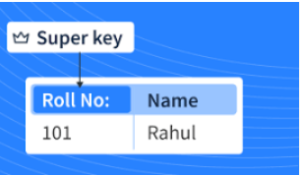Keys in DBMS Database Management System , keys are important. They help organize and find data quickly. A key is like a unique label for each record in a database. This article will explain different types of keys in simple words that a 7th-grade student can understand.
Read more: Understanding Fragmentation in OS
Primary Key
A primary key is a special key in a database table. It is unique for each record. This means no two records can have the same primary key. For example, in a school database, each student might have a unique student ID.
This student ID is the primary key. It helps in quickly finding a student’s information.

Foreign Key
A foreign key is used to link two tables together. It is a field in one table that is the primary key in another table. This helps in maintaining relationships between tables.
For instance, in a school database, a foreign key can link the student table and the class table, showing which student is in which class.
Composite Key
A composite key is a combination of two or more columns in a table. These columns together create a unique identifier for a record. For example, in a class database, the combination of class name and student roll number can be a composite key.
This ensures that each student in a class is unique.
Candidate Key
A candidate key is a field or a set of fields that can uniquely identify a record in a table. There can be multiple candidate keys in a table.
For instance, in a student table, both student ID and email can be candidate keys because both can uniquely identify a student. However, only one of them is chosen as the primary key.

Super Keys In DBMS
A super key is any set of one or more fields that can uniquely identify a record in a table. Every primary key is a super key, but not every super key is a primary key. For example, in a table, student ID and student name together can be a super key if combined they uniquely identify a record.

FAQs
What is a primary key?
A primary key is a unique identifier for each record in a database table. It ensures no duplicate records.
Why is a foreign key important?
A foreign key links two tables together, helping to maintain relationships between them. It ensures data consistency.
What is the difference between a candidate key and a primary key?
A candidate key can be any field that uniquely identifies a record, while a primary key is the chosen candidate key used to uniquely identify records in a table.
How does a composite key work?
A composite key combines two or more fields to create a unique identifier for a record, ensuring uniqueness across the combined fields.
Can a table have more than one primary key?
No, a table can have only one primary key. However, it can have multiple candidate keys, but only one is selected as the primary key.
Conclusion
Understanding keys in a DBMS is essential for organizing and retrieving data efficiently. Keys ensure that each record is unique and help in maintaining relationships between different tables.
Primary keys, foreign keys, composite keys, candidate keys, and super keys all play vital roles in a database system. By knowing how these keys work, one can better manage and use databases effectively.








